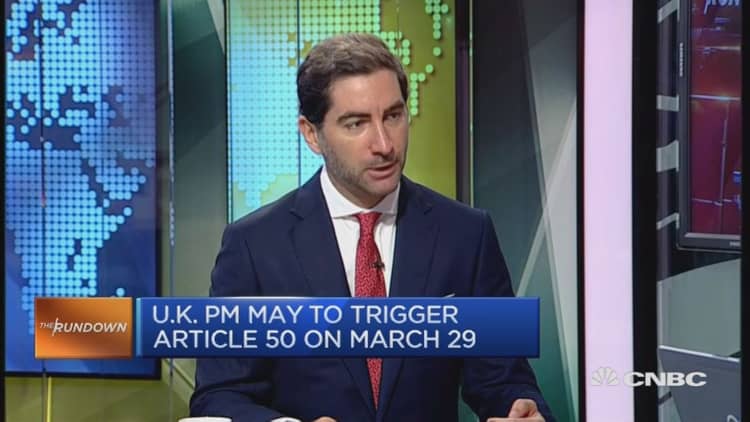
The U.K. is staring down the barrel of either a hard Brexit or a very hard Brexit and that's going to bring four types of market distress, Alberto Gallo, a portfolio manager and head of macro strategies at Algebris Investments, told CNBC on Tuesday.
"The European Union's incentive is to give the U.K. a bad deal. If they give them an average deal, then other countries will have the possibility of doing the same in the future," Gallo told CNBC's "The Rundown" on Tuesday.
At the same time, the U.K. has been very secretive about its negotiating positions, frustrating other EU countries and investors and creating market uncertainty, he added.
Algebris Investments had $7 billion in assets under management at the end of February.
The U.K. will formally kick start its divorce proceedings with the EU on March 29, representatives of the government led by Prime Minister Theresa May said earlier this month.
Gallo pointed to four market stresses ahead for the U.K.
The first will come from the depreciation of , he said, although he noted that while it could fall further, that's largely played out already.
The pound has dropped from as high as $1.50 just before the vote to exit the European Union to as low as $1.1979. On Tuesday, it was trading around $1.2560.
That will spur the second market stress, higher inflation, he said.
"That hurts people. It hurts in particular the middle-and-low wage families that are exactly the ones that voted Brexit," he said. "Populism is bad for the same people it's advocated for. These are people that have not seen their wages go up in the last decade and now they're going to see the prices of food and other goods going up."
He noted that the U.K. imports around 50 percent of its food and 70 percent of its fruits and vegetables, adding that higher prices will force people to squeeze consumption.
The third stress will come from the U.K. government needing to increase spending in the wake of Brexit, which will likely increase the cost of funding, he said.
The fourth market stress could come from a drop in property prices, Gallo said.
Algebris has estimated that the U.K. economy could contract by 7.5 percent of gross domestic product (GDP) over the next seven to eight years in the aftermath of Brexit, or the equivalent of 300 million pounds ($376.92 million) a week over the period for a total of around 175 billion pounds.
"If you have a very hard Brexit and there is more uncertainty, and job losses, then you start having potential property market declines because you have people who lose their jobs, who can't pay their mortgages and so on. That is the worst case scenario," Gallo said.
He noted that there have already been signs that Brexit was spurring job losses.
"What you're seeing already is banks and other companies already pre-emptively relocating jobs outside of London, outside of the U.K.," Gallo said. "There's a lot of uncertainty and there is the impression, we have the impression, there is no real economic and political plan to deal with a post-Brexit U.K. economy."
—Phillip Tutt contributed to this article.
—By CNBC.Com's Leslie Shaffer; Follow her on Twitter @LeslieShaffer1


